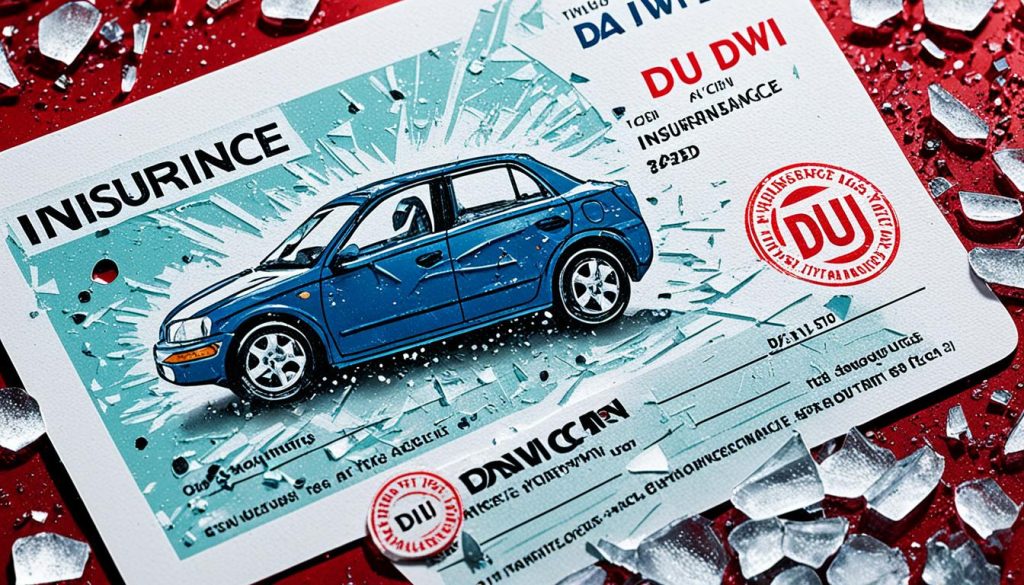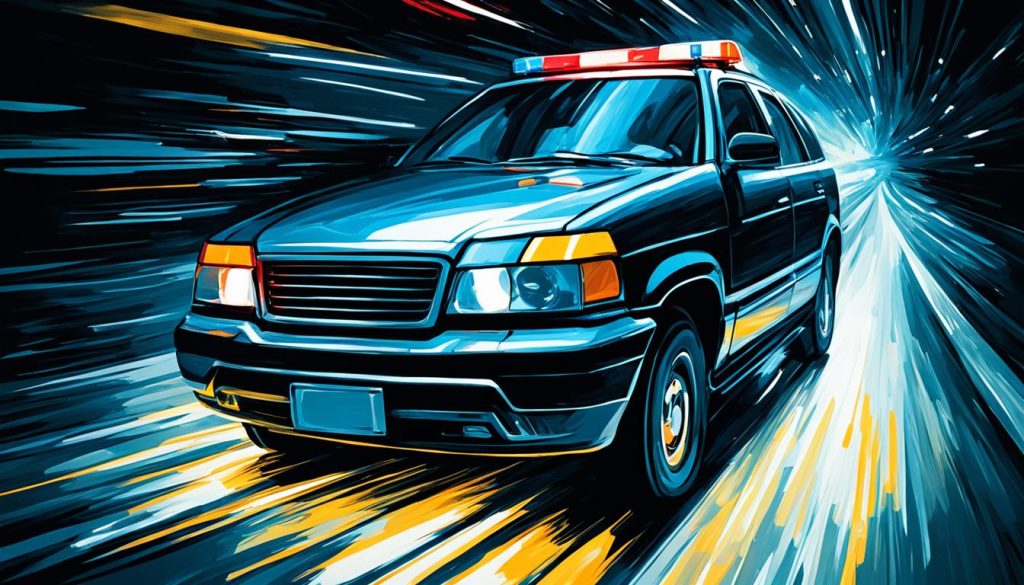Driving under the influence of alcohol or drugs is a serious crime in the United States. It has big legal and personal effects. Every year, about 35,000 people get arrested for driving under the influence1. It’s important for drivers to know the penalties of a DUI/DWI conviction, like jail time, fines, losing your license, and long-term effects on your life, job, and money.
The legal limit for blood alcohol concentration (BAC) in Florida is 0.08%2. But, drivers under 21 and commercial drivers have lower limits2. If you refuse a breathalyzer or field sobriety tests, your license will be taken away under Florida’s implied consent laws2. Make sure you know the laws in your state to understand the risks of driving under the influence.
Key Takeaways
- Driving under the influence of alcohol or drugs is a criminal offense with serious consequences.
- The legal BAC limit in Florida is 0.08%, with lower limits for underage and commercial drivers.
- Refusing to take sobriety tests can result in automatic license suspension.
- Even a first-time DUI charge can have long-lasting impacts on your life and career.
- Understanding the laws and potential penalties is crucial to avoid the consequences of a DUI/DWI conviction.
Defining DUI and DWI Charges
The terms “DUI” (driving under the influence) and “DWI” (driving while intoxicated) are often used together, but they mean slightly different things in law. A DUI means driving with a blood alcohol content (BAC) over 0.08% in most places3. DWI usually means you’re more impaired, with a BAC of 0.08% or higher4. Some places, like Washington, D.C., say a BAC of 0.20% or above is very high4. Others, like South Carolina, consider a BAC of 0.10% as high4.
Differences Between DUI and DWI
Even though people often mix up DUI and DWI, there are small differences in what they mean legally. In New York, for example, DUI can be called Driving While Intoxicated (DWI), Aggravated DWI, or Driving While Ability Impaired by Alcohol (DWAI/alcohol)5. Young drivers in New York can even get charged for a BAC between 0.02% and 0.07%5.
Both DUI and DWI mean the driver was driving while drunk or on drugs, which is illegal4. The punishment for these crimes can change based on where you got caught, how many times you’ve been caught before, if there were kids in the car, and your BAC level4.
In short, while DUI and DWI are often used together, they have different legal meanings and outcomes. It’s important to know the differences if you’re facing these charges453.
Consequences of a DUI/DWI Conviction
The penalties for a DUI/DWI conviction can be severe and vary widely. They depend on the state, the offense circumstances, and if it’s a first-time or repeat offense6. Common consequences include jail time, fines, license suspension, mandatory ignition interlock devices, and court-ordered rehab programs.
Even for a first-time DUI, the penalties can be big. In many states, the maximum jail time is up to six months, with fines from $500 to $2,000 or more6. Drivers convicted of a DUI may also face higher auto insurance rates or even policy cancellation. They might need to get high-risk insurance6.
A DUI/DWI conviction can have a big impact over time. It can affect an individual’s ability to drive, their career, and their finances6. In some states, a first offense DUI is seen as a civil infraction, while in others it’s a misdemeanor6. If the DUI was severe, like with a high blood alcohol level or causing harm, the penalties can be even worse, including longer jail time6.
| Offense | Jail Time | Fines | License Suspension | Ignition Interlock Device |
|---|---|---|---|---|
| First DUI in California | Up to 6 months | $390 – $1,000 | 6 months | 6 months |
| Second DUI in California (within 10 years) | 96 hours – 1 year | $390 – $1,000 | 1 year | 1 year |
| Third DUI in California (within 10 years) | 120 days – 1 year | $390 – $1,000 | 3 years | 2 years |
The consequences of a DUI/DWI conviction can last a long time. This shows why it’s important to know the possible penalties and get legal advice if you’re facing charges678.

“The penalties for a DUI/DWI conviction can be severe and can have a lasting impact on an individual’s life. It is crucial to understand the potential consequences and take steps to avoid such a situation.”
The Impact on Your Life
A DUI/DWI conviction can change your life in big ways. Right away, you might lose your driver’s license. This makes getting to work, doing errands, or following your usual routine hard9. Also, having a criminal record can make it tough to find a job since many employers check your background and see a DUI as a risk9. The costs of a DUI don’t stop there. You’ll face fines, court fees, higher insurance rates, and the cost of programs ordered by the court9.
Long-Term Effects of a DUI/DWI Conviction
A DUI/DWI can affect you long after you’ve finished your sentence. It stays on your record and can impact your career, education, and personal life for years10. Landlords might not want to rent to you, and some companies might not hire or rent cars to people with a DUI10.
Professionals in fields like real estate, finance, or law might struggle to get or keep their licenses with a DUI on their record10. A DUI can also hurt your personal life. It might affect divorce, child custody, and even adoption10.
Choosing to drive under the influence can lead to big changes in your life10. DUI charges can end your job or limit your options, especially if driving is key to your work. This includes jobs like delivery, real estate, and some construction roles, depending on where you live11. A DUI can also affect college applications, making it harder to get scholarships and financial aid11.
A DUI can have lasting effects on your money, travel, and even your immigration status11. If you’re in the U.S. on a visa or green card, a DUI could lead to deportation. This shows how serious the consequences can be11.
In conclusion, a DUI/DWI conviction can deeply affect your life. It can impact your job, education, relationships, and money. Understanding the serious effects of such charges is key. It highlights the need for careful decisions when driving91011.
DUI/DWI Charges and Insurance Rates
If you’ve faced a DUI or DWI charge, you’re dealing with legal issues and higher car insurance rates. Insurance companies see drivers with DUI/DWI records as high-risk. This can lead to a big hike in your premiums1213.
Drivers with DUI or DWI convictions often pay 28% to 51% more for insurance12. In some cases, the increase can hit 88%, making full coverage insurance cost about $4,790 a year13. You might also lose your insurance, making finding new coverage even pricier.
In some states, you must have an SR-22 form, a financial responsibility certificate12. This doesn’t directly affect your premium but can make insurance more expensive due to higher coverage limits and fees.
The seriousness of your DUI/DWI charge and your state’s laws affect how long the conviction stays on your insurance record12. A DWI can be on your record for 3 to 5 years, while a DUI can last up to 10 years or even forever in some places12. This can keep affecting your insurance rates for a long time.
The effect of a DUI/DWI on insurance rates varies by location13. For instance, in California, a DUI can raise insurance rates by up to 185% a year14. Looking around for insurance can help you find better deals, as costs after a DUI differ a lot by carrier, location, and personal factors.

A DUI or DWI charge can greatly affect your finances, with higher insurance costs being a big burden. Knowing the possible effects and how to lessen the impact on your insurance rates is key for high-risk drivers121314.
Defending Against DUI/DWI Charges
If you’ve been charged with a DUI/DWI, getting help from an experienced dui defense attorney is key. Even a first-time DUI can lead to serious consequences. A good lawyer can guide you through the legal process and build a strong defense.
Challenging field sobriety tests is a common defense strategy. Only 35% of cases mention erratic driving as signs of intoxication15. Sometimes, other reasons can explain physical symptoms, which can help defend against DUI charges16.
Issues with breathalyzer tests are often raised as a defense. Problems with the machines’ calibration are common16. If there was no good reason for the traffic stop, this can also be used as a defense16. The need for legal help on these breathalyzer issues is clear, as many cases question their reliability16.
Even with strong evidence, a skilled dui defense attorney can lessen the impact of a DUI/DWI conviction. They might negotiate a deal to reduce charges or penalties17. Challenging the arrest’s validity can be tough, especially with evidence like breath-test results17. Yet, a good lawyer can still find and tackle issues with the tests and their administration1715.

Remember, facing DUI/DWI charges means you need a dui defense attorney to help you. With their skills and commitment, you might get a good outcome in your case161715.
Conclusion
Dealing with DUI/DWI charges is very important. Even if it’s your first time, it can greatly affect your life18. You could lose your driver’s license and face big financial and career problems19. It’s key to take these charges seriously and get help from a skilled criminal defense lawyer.
Creating a strong defense and looking into plea deals can lessen the effects of a DUI/DWI charge20. Knowing the legal side and finding a good lawyer can change how your case goes20. The best way to dodge the stress and bad outcomes is to never drive after drinking or using drugs.
The importance of understanding DUI/DWI charges, seeking legal counsel, and making responsible decisions is huge. By acting early, you can safeguard your rights, future, and keep everyone safe on the roads.
FAQ
What is the difference between a DUI and a DWI?
DUI and DWI are often used together, but they mean slightly different things in each state. DUI means driving with a blood alcohol content (BAC) over 0.08%, the legal limit in most places. DWI usually means you’re more impaired, with a BAC of 0.08% or higher. Some states use DWI for any level of impairment, while others make a distinction by BAC level.
What are the potential consequences of a DUI/DWI conviction?
DUI/DWI penalties vary by state and offense circumstances. You could face jail time, fines, losing your license, and more. Even a first-time DUI can lead to up to a year in jail and fines up to ,500.
How does a DUI/DWI conviction impact my life long-term?
A DUI/DWI conviction affects you long-term in many ways. You’ll lose your driver’s license, which can change your daily life. It can also make it harder to get a job and increase your costs with fines, insurance hikes, and program fees.
How will a DUI/DWI affect my car insurance rates?
A DUI/DWI conviction will raise your car insurance rates. Insurance companies see impaired drivers as high-risk and will increase your premiums. After a DUI or DWI, you can expect your annual insurance costs to go up by about 88%.
How can I defend against a DUI/DWI charge?
If you’re facing a DUI/DWI charge, get an experienced criminal defense lawyer. They can challenge sobriety tests, question BAC tests, or try to get your charges reduced. If there were mistakes during your arrest, like not being read your rights, they might help drop or lessen the charges.
Source Links
- State of Florida.com | Florida DUI (Driving under the influence)
- Understanding DUI Laws in Florida – Learn More
- DUI & DWI Law Center
- What is the Difference Between DUI and DWI? | Bankrate
- DUI Vs. DWI: What’s The Difference?
- DUI & DWI Legal Penalties and Consequences
- 1st Time Misdemeanor DUI in California: What to Do Next
- California’s DUI Laws: What are the Penalties?
- Long-term DUI Consequences
- 7 Stressful Ways a DUI Impacted My Life | Sober.com
- Unexpected Ways a DUI Can Impact One’s Life | Law Offices of Brian D. Sloan
- How a DUI or DWI Can Affect Your Car Insurance
- Car Insurance for Drivers With a DUI | Bankrate
- Getting Car Insurance in California After a DUI (2024)
- Good DUI Defenses – Top 10 Ways to Beat The Charge
- Defenses to DUI & DWI Charges Under the Law
- DUI Defenses: How to Fight a Drunk Driving Charge
- Understanding DUI/DWI Charges: A Comprehensive Guide
- The Consequences of DUI and DWI: Understanding Your Rights and Legal Options
- Navigating OWI/DUI/DWI Charges: Legal Issues, Defenses, and Impact – Adam Pollack Law – Iowa City Attorney At Law

